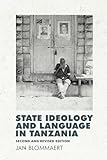State Ideology and Language in Tanzania : Second and revised edition / Jan Blommaert.
Material type: TextPublisher: Edinburgh : Edinburgh University Press, [2022]Copyright date: ©2014Description: 1 online resource (184 p.) : 6 B/W illustrationsContent type:
TextPublisher: Edinburgh : Edinburgh University Press, [2022]Copyright date: ©2014Description: 1 online resource (184 p.) : 6 B/W illustrationsContent type: - 9780748675791
- 9780748675814
- Ideology -- Tanzania
- Ideology -- Tanzania
- Ideology
- LANGUAGE ARTS & DISCIPLINES / Linguistics / General -- Tanzania
- Language planning -- Tanzania
- Language planning -- Tanzania
- Language planning
- Language policy -- Tanzania
- Language policy -- Tanzania
- Language policy
- POLITICAL SCIENCE / Public Policy / Cultural Policy
- SOCIAL SCIENCE / Anthropology / Cultural
- SOCIAL SCIENCE / Popular Culture
- Swahili language -- Political aspects -- Tanzania
- Swahili language -- Political aspects -- Tanzania
- Swahili language -- Political aspects
- Language & Linguistics
- LANGUAGE ARTS & DISCIPLINES / Linguistics / General
- 417.7 22//gereng
- P119.32.T34 B58 2014
- online - DeGruyter
- Issued also in print.
| Item type | Current library | Call number | URL | Status | Notes | Barcode | |
|---|---|---|---|---|---|---|---|
 eBook
eBook
|
Biblioteca "Angelicum" Pont. Univ. S.Tommaso d'Aquino Nuvola online | online - DeGruyter (Browse shelf(Opens below)) | Online access | Not for loan (Accesso limitato) | Accesso per gli utenti autorizzati / Access for authorized users | (dgr)9780748675814 |
restricted access online access with authorization star
http://purl.org/coar/access_right/c_16ec
An extended case study on Tanzania highlighting the latest theoretical and methodological approaches in sociolinguisticsGBS_insertPreviewButtonPopup(['ISBN:9780748675791','ISBN:9780748675807','ISBN:9780748675814','ISBN:9780748675838']);Tanzania is often seen as an exceptional case of successful language planning in Africa, with Swahili being spread to all corners of the country. Yet, this objective success has always been accompanied by a culture of complaints proclaiming its utter failure.State Ideology and Language in Tanzania sets out to explore this paradox through a richly documented historical, sociolinguistic and anthropological approach covering the story of Swahili from the early days of independence until today. Focusing on the ways in which Swahili was swept up in the 'Ujamaa revolution' - the transition to socialism led by president Nyerere - Jan Blommaert demonstrates how the language became an emblem not just of the Tanzanian 'cultural' nation, but above all of the 'political' nation. Using Swahili meant the acceptance of socialism, and the spread of Swahili across the country should equal the spread of Ujamaa socialism. When this did not happen, the verdict of failure was proclaimed on Swahili, which did not prevent the language from becoming one of the most widely used and dynamic languages on the continent.This book is a thoroughly revised version of the 1999 edition, which was welcomed at the time as a classic. It now extends the period of coverage to 2012 and includes an entirely new chapter on current developments, making this updated edition an essential read for students and scholars in language, linguistics and African Studies."
Issued also in print.
Mode of access: Internet via World Wide Web.
In English.
Description based on online resource; title from PDF title page (publisher's Web site, viewed 24. Mai 2022)


